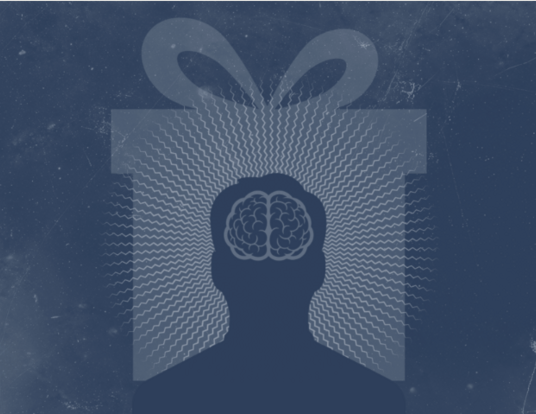Colloquy Podcast: The Best Poetry Critic in America
For this special Poetry Month bonus episode of Colloquy, a conversation with Harvard Professor Helen Vendler, PhD ’60—once called “the best poetry critic in America” by The New Republic’s Alfred Kazin—about the art of verse and why both the poetic form and its great works have enduring value in the era of the social media-induced seven-second attention span.
This transcript has been edited for clarity.
My friend Theo Theoharis teaches in the Department of Comparative Literature at Harvard, and a few weeks ago, he was actually walking me through some poems. As he introduced the poems and the form, he mentioned that the creed of the Greek Orthodox Church literally refers to God as the Poet of Heaven and Earth. Could you talk a little bit about what that religious reference reveals to us about the ways that poetry differs from other uses of language and other literary forms?
The use of the word about God, that He's a maker of Heaven and Earth, is the same Greek root, as you said, for poetry. Poetry is simply something made. It has to have been conceived of, organized, voiced, and then tinkered with until it clicks into shape. Poetry is a dynamic form. It often ends very differently from where it began, as you know from George Herbert. At the end of "The Collar," after he's been railing at God, he finally hears the voice saying, "Child." And Herbert replies, "My Lord." So, from being extremely angry at God, he ends up saying, "I struck the board and cried, No more. / I will abroad."
When you're reading a poem, often they're reduced to statements as though they were position papers. But they are not position papers. They're a transcript. Eliot said the best thing about it, in "Prufrock," "as if a magic lantern threw the nerves in patterns on a screen." So that's what seemed to be a poem. It's sort of an EKG. It keeps doing things on a screen where you can follow it.
But you would be very much mistaken if you didn't see almost every word as a progression of the mind thinking. And it's the private mind because it's not a dialogue. It's not directed primarily at the reader. At first, it's trying to make something that will click. Eventually, you have to think of the reader and say, "Would anybody understand this?" or "Is this too peculiar a word?" When Eliot says, "philoprotogenerative" or whatever it is in "Mr. Eliot's Sunday Morning Service," he's using a word that nobody knows. You have to take thought, if you're a poet, to do something like that. It's a deliberate insult, in a way, to the reader.
Yet there's such a temptation, once in a while, for every poet, to put the contents of this mental procedure on paper, no matter how hard it is, if it reflects the contour that at that moment your mind is doing. It's a mimetic act. And it's tracking a living process.
So is poetry, in terms of literary forms, the most direct way of experiencing another consciousness?
For me, it is the most direct way. However, for others who do not read poetry, they may ask where the characters, plot, action, scene, setting, comedy, or tragedy are, as these elements require social input. Novels and plays, on the other hand, have an obligation to present at least a protagonist or antagonist and something going on between them. Novels also have the additional obligation to set an entire scene, unless they are like Beckett's works. Depending on one's interest in the social world, one might prefer drama or novels and consider them to be better portrayals of human life. However, I prefer the inward life to the social life. I am interested in what happens in reflection, meditation, thinking, or arguing with oneself. Matthew Arnold said that poetry is the dialogue of the mind with itself, and it involves conflict and drama. The words on the page are like actors on a stage, making their entrance and delivering their lines. Poetry can use archaic language, technical language, or a whole new register, and can be hysterical or melancholy. Watching each word perform on the stage is thrilling because one never knows what they will say.
You talked about, just a little bit ago, poetry as an expression of the private mind. But that made me think about the epic form, particularly in Greece and Rome, where there's also a very public function to it. Do you have any thoughts about how those are balanced and how that changes as poetry moves through the ages?
Well, Northrop Frye used to reflect—it was a term he invented, and I liked it—I listened to him talk here for a year when he was a visiting professor. And he was doing The Anatomy of Criticism out loud on stage, which was thrilling. It was all new to me. And he talks about the radical of presentation. Is this thing saying to you, "I'm telling you a story," or is it saying, "I'm meditating"? Or is it saying, "I'm quarreling with somebody"? And the mode of presentation governs. So, all narrative poetry is governed by, you might say, the acts of narrative. It has words. But if the story were different, other words would be there too.
When something is narrative, it means it's a social form. It means it has lots of evolution, development, action, plots. And so, you have to think of it, first and foremost, as a narrative. The same with the play—first and foremost, it's people exchanging language. And as I say, they didn't feel natural to me, those forms. I used to look at novels and say, "Why do people read these, because there's so much in the way of extrinsic detail—what people were wearing or who was plotting against whom or something." And I didn't want to know that. I wanted to know what they were thinking.
And there wasn't enough in a novel—except for autobiographical novels, which, of course, I like. And memoirs and letters, anything where the personal thinking process is going on. So then, I mean, as everybody says, what you had was a lot of anonymity in the lyric, if you think of Christmas carols and so on. And then when it got a signature, you might say, when an author's name began to be attached to it and a whole corpus of work could be assembled for that author, and you could put out collected poems of some of Shakespeare's sonnets.
It's such a wretched little book. I don't know if you've ever seen it. We have one of the 15 copies in the world here. And there are four sonnets when you open the book, two on each page. They're cramped. The book is very small. There are hardly any margins. It has little numbers in front of each sonnet. So, you even have four little title numbers on each double-page. And to think that they could be called, so long ago in 1609, Shakespeare's sonnets.
I mean, a particular form, a particular author, a particular audience—because it was a book being published and sold—it is—I don't know. When it goes beyond the author function, as we would say, into everything down to the breaking of form that happens—it happens all the time but in different ways.
Yeats sometimes breaks form, for instance, by having a poem in quatrains rhyming A-B-A-B. And then it keeps going down the page, A-B-A-B, A-B-A-B, A-B-A-B. And then suddenly the last stanza has A-B-A and there's a missing line. He did that to his own epitaph. When he wrote it first, it was a quatrain. He imagines the old form of epitaph where you're going along on a horse and then you stop and contemplate the gravestone of the person who has died. And then you say, "may the Earth lie lightly on him." And then you continue your journey.
So that's what Yeats was imagining on his grave for his own epitaph. In its final form, it is on his grave in Sligo in Drumcliffe Churchyard. But it originally mimicked the action of the horseman going by. It said, "draw rein"—the reins of the horse—"draw breath,” pause, “Cast a cold eye on life, on death. Horseman, pass by." So that was his nice little quatrain, rhyming quatrain. He thought, no. That's too inert a beginning—draw rein, draw breath.
And the poem—an epitaph doesn't really need another person in it. The horseman—to start with the horseman, not with the dead person and the gravestone, seemed an inert way, I guess, to him. And not shocking enough for an elegy. So, it now is simply the three lines—"cast a cold eye on life, on death." And then "horseman, pass by."
You could be addressing somebody else in the street when you say, "horseman, pass by." And it's not yourself on the horse, which is not important for the elegy about somebody else. Who cares whether you're on a horse or not? And so those three lines are engraved on his slate gravestone as he wished.
So that's a brilliant little example: "A cold eye on life, on death. Horseman, pass by." Is Yeats suggesting having an attitude of equanimity?
Well, cold is worse than equanimity. What a lyric poem requires, at least, is that you have to, at some point, step out of your thinking process and think of it as a made thing, not simply as a transcript of your thoughts like an EKG. In that case, you could write anything, as people sometimes do, and as people thought Allen Ginsberg was doing, but he wasn't—at least in his great poems, he wasn't. He had some filler towards the end of his life, but he was less appreciated than he should be. Some of the greatest poems of the 20th century came from him.
But the cold eye is the eye of the craftsman, or the couturier, or whoever is making the thing. Shall I do a piping here? Or shall I fell that seam? Or shall I dye it or not? The cold eye is the eye of estimation, judgment, and evaluation. You're not going to be a good artist unless you can cast a cold eye on life and on death. And when life is finished—as it is, the grass, the gravestone, tells you when you're in front of it.
I think he's also thinking of some of the beautiful and so moving Greek steles where people are putting a hand on the shoulder of the person who's going to leave and go to the underworld. It's often a husband and a wife. Just the single gesture of affection is the thing that's saying goodbye, the thing that you can't bear when you look at those things. But the sculptor was not thinking about how sad that couple must have been to part. He had to think, do I sit her down? Do I stand him up? Those things. That's the cold eye.
Every time I hear you quote a line of poetry, it feels deeply enchanting to me, and it makes me wonder if, as religion—particularly institutional religion—sort of fades more and more over time, although not necessarily the religious impulse or the spiritual impulse, you experience or understand poetry as something that has the ability to enchant our lives?
Well, only for some people. My baby brother was forbidden to be one of the three kings in the Christmas pageant. He was forbidden to sing. He was allowed to be in it, but his monotone would drag the other two kings down. So, he could have a crown and a box of frankincense or something, but he was not allowed to sing. And if you have a monotone in the family, it's like having somebody who's dyslexic or something. Dyslexic people have a hard time with language, and it's an obstacle.
So then, I do think one is born—of course, musicians are born musical, or they could never do what they do. You have only to see a page of a score to be astonished, and it's not learnable in its most complex forms. It has to have a creative component. Even simple songs have a very creative component in them somewhere, or they wouldn't last. And I think that's why hearing a living voice is important to me. It's another voice talking to me, you might say, across the page, and it's an interesting voice to listen to.
So, if you have that response to language, which I always have had—a lesser one to music—but you need some kind of ear to read poetry with any affection. I think you have to have the groundwork for any given art before it becomes, if not a sacred space to you, at least an enchanting space.
I wonder what sense you make of this kind of digital culture we're in. Some people would call it a culture of distraction, because I've always experienced poems as things that really require my attention, you know? They require me to be present, which is probably why I can't read very long poems because they're a little too rich for me for too long a time. But I mean, have you seen attention spans change? Have we become less able to be with a poem?
Well, of course, the visual has replaced the linguistic in our culture, and kids used to grow up reading books. Now they grow up watching screens. It's a different education, and it's not an education in anything linguistic, from diagramming sentences up to etymology. They don't know the roots of words because they don't have any other language, and they don't have to study Latin anymore. Everybody had three years of Latin when I was growing up. In any standard high school, that was one of the components, and it helps you know what words mean when you know the roots of them. And now the roots have vanished because people aren't seeing the words as shapes on a page. They're just hearing the words, and they learn language from television. I mean, they learn their own language from television so that they speak in television-ese and then turn it into words.
I remember the first time I saw a child saying, "Well, this wasn't difficult pursay"—P-U-R-S-A-Y. It didn't occur to me that anyone could think what the person was saying was spelled P-U-R-S-A-Y. The student knew what it meant but didn't know what language it was written in, you might say. And the first time I saw "segue" used as a written verb, it's just—you realize how fast language does change and how fast one kind of culture replaces another. I'm sorry that people are losing the entire corpus of English poetry. I'm sorry they're losing the corpus of the Bible because all the allusions just disappear from the table, and they have no idea what they're reading essentially because they're not picking up the ping pong.
I mean, on the face of it, poetry makes demands of us that are kind of opposed to a digital and a visual age. And yet, I wonder if one of the ways in which poetry has enduring value is in its ability to really make us pay attention.
Well, that's the point of amassing things you remember in any—in science, as well as in art. You go to a museum to pay attention too. But I wasn't a visual person. So, although I was taken to the Museum of Fine Arts—largely to see the mummies—by my parents, I didn't know what you were supposed to do with it or do with the painting.
And then one day—as I've said in public, I think, before—I was very unhappy about a breakup with a boy I was in love with in graduate school. And I just fled the campus and went to the Museum of Fine Arts. And I was suddenly made happy. And I thought, that's what it's supposed to do. It's supposed to make me happy. And I realized it had something in common with poetry, which always made me happy, and with reading, which always made me happy. And suddenly, it just opened up in the way I had always known that music was there to make you happy, so that was okay.
But I felt so inept as a processor, you might say, of visual arts, that it wasn't until I could sort of think, it's all right to be happy and stand in front of them. And then eventually, you begin to get interested. And you read books and you get more of that equipment than you had when you were just uncomfortable.
The Colloquy podcast is a conversation with scholars and thinkers from Harvard's PhD community on some of the most pressing challenges of our time—from global health to climate change, growth and development, the future of AI, and many others.
About the Show
Produced by GSAS Communications in collaboration with Harvard's Media Production Center, the Colloquy podcast continues and adds to the conversations found in Colloquy magazine. New episodes drop each month during the fall and spring terms.
Talk to Us
Have a comment or suggestion for a future episode of Colloquy? Drop us a line at gsaspod@fas.harvard.edu. And if you enjoy the program, please be sure to rate it on your preferred podcast platform so that others may find it as well.
Get the Latest Updates
Join Our Newsletter
Subscribe to Colloquy Podcast
Simplecast





